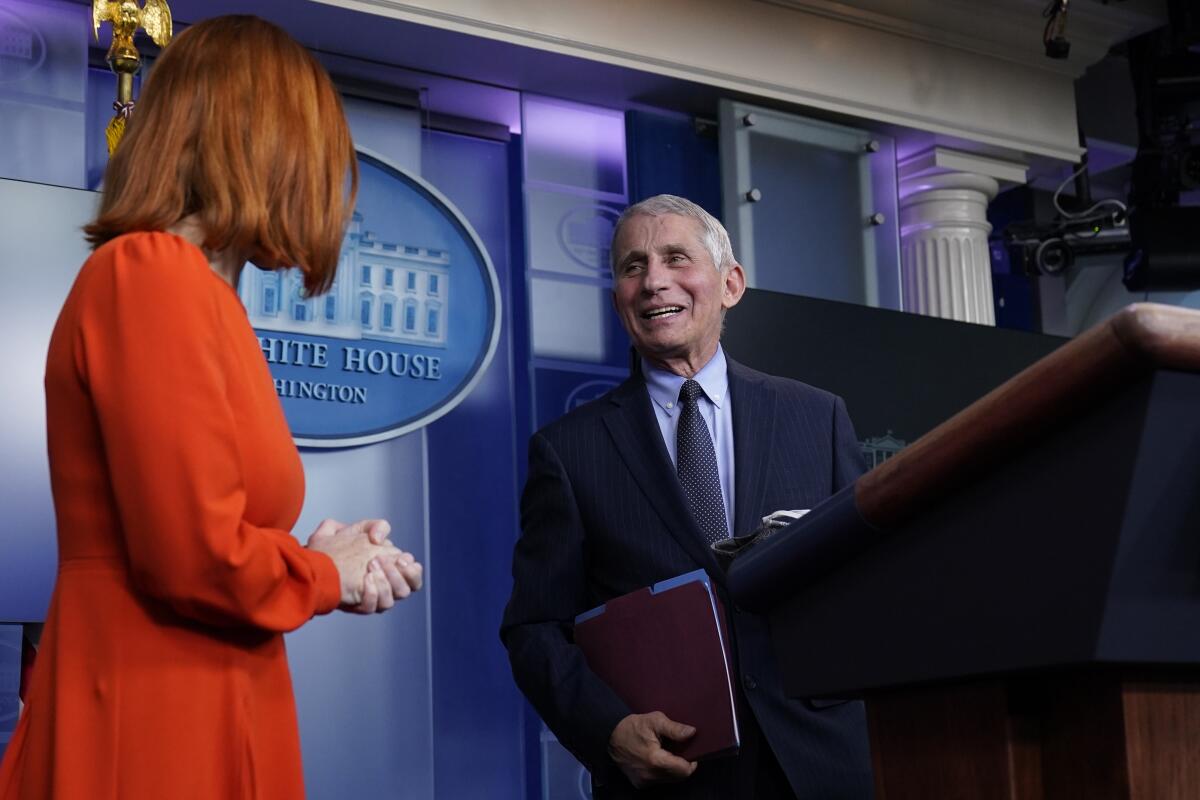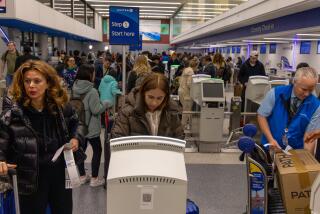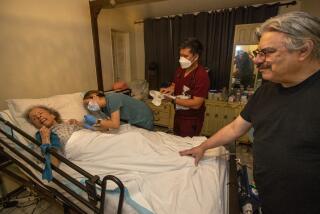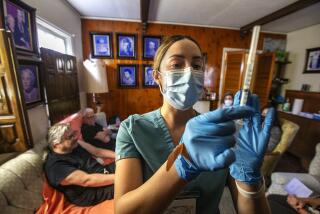‘Worrisome’ California and N.Y. coronavirus variants raise specter of new outbreaks

New coronavirus variants that have emerged in California and New York are “worrisome” reminders that it’s too soon to roll back pandemic restrictions, said Dr. Anthony Fauci, the nation’s leading expert on infectious diseases.
Fauci’s comments Sunday on several national news programs echoed those of the director of the U.S. Centers for Disease Control and Prevention, Dr. Rochelle Walensky. At a briefing Friday, she expressed concern over the two variants, which “appear to spread more easily and are contributing to a large fraction of current infections in those areas, adding urgency to the situation.”
Recent data suggest the drop in new daily coronavirus cases in the U.S. has stalled, with cases hovering around 70,000 a day, Fauci said Sunday. He warned against moves like Massachusetts’ decision to lift capacity restrictions on indoor dining.
“It is really risky to say, ‘It’s over; we’re on the way out,’” Fauci said on CNN’s “State of the Union.” He noted that in past periods of the pandemic, “when we started to pull back prematurely, we saw the rebound. We definitely don’t want that to happen.”
In comparison to other states, California is moving cautiously in reopening businesses.
Currently, just 4% of Californians live in counties that are permitted to allow indoor restaurant dining and indoor gym operations — and even then, only at reduced capacity. That percentage could rise to 13% later this week if trends continue and seven more counties — including Santa Clara, San Francisco and San Luis Obispo — are able to leave the state’s most restrictive COVID-19 tier.
On NBC’s “Meet the Press,” Fauci said the nation needed its average number of new daily coronavirus cases to drop much lower, “particularly in light of the fact that we have some worrisome variants that are in places like California and New York and others that we’re keeping our eye on.”
Some experts are withholding judgment on the California variant, known as B.1.427/B.1.429. Scientists at UC San Francisco say the strain spreads more easily than its predecessors and is now dominant in California. In laboratory tests, it was shown to be less vulnerable to antibodies generated by COVID-19 vaccines or by prior infections. During the state’s holiday surge, the homegrown strain was also associated with more severe illness and death.
But others are frustrated that the UCSF team hasn’t yet shared its data with the public.
“Science is not a process where you just take one person at their word. It’s a process where everybody looks at the evidence, and a consensus is reached among scientists — and that process has not happened,” said Dr. Otto Yang, an infectious diseases expert at UCLA. “There are plenty of reasons to doubt the final conclusions.”
In assessing the risk posed by the California variant, Yang said it was important to consider that cases, hospitalizations and deaths in the state had fallen in recent weeks.
But other researchers, including Fauci, said a competition between the homegrown strain and the one from the U.K. could fuel a survival-of-the-fittest contest that would accelerate the spread of the strain that’s best able to elude the effects of COVID-19 vaccines.
Dr. Scott Gottlieb, a former commissioner of the U.S. Food and Drug Administration, said on CBS’ ”Face the Nation” Sunday that he didn’t believe the California or New York variants were responsible for the recent uptick in cases nationally. The more likely factor, he said, is spread of the U.K. variant, which the CDC has said could become the dominant strain in the U.S. by the end of March.
Meanwhile, with the U.S. Food and Drug Administration giving emergency-use authorization to the Johnson & Johnson COVID-19 vaccine over the weekend, states across the country were eagerly anticipating additional doses of vaccine. Gov. Gavin Newsom on Friday said California anticipated receiving 380,300 doses of the J&J vaccine this week and shipments of similar size over the next several weeks.
Unlike the Moderna and Pfizer vaccines, which require two doses and shipping and storage at ultra-cold temperatures, the Johnson & Johnson shot requires only one dose and needs only normal refrigeration. The Johnson & Johnson vaccine was found to be 85% effective at preventing severe cases of COVID-19 and, among people who received the shot in tests, led to no hospitalizations or deaths, including in South Africa and regions of Latin America where troubling new variants of the virus have become more common.
Amid a clamor for more official guidance from the U.S. government on what people can do once they’re fully vaccinated, Fauci said on CNN that advice was coming from the CDC soon, perhaps within the next few weeks.
Fauci suggested that dinners with family and friends — minus the masks — could be in the offing.
“If you have individuals, adults who are vaccinated ... then you can do things that we weren’t talking about before. You can have dinner in a home without masks on,” Fauci said on CNN. “You can have friends who you know are doubly vaccinated and are protected together with you. So, you can start doing things ... in a setting where you’re not out in the community.”
Times staff writer Emily Baumgaertner and Melissa Healy and the Associated Press contributed to this report.
More to Read
Start your day right
Sign up for Essential California for news, features and recommendations from the L.A. Times and beyond in your inbox six days a week.
You may occasionally receive promotional content from the Los Angeles Times.







